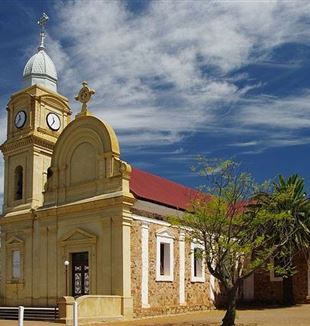
Taking one’s Pulse on the other side of the world
The last weekend in May, the adults of the Perth community and the CLU students of the University of Western Australia attended the Fraternity Exercises in New Norcia...The last weekend in May, the adults of the Perth community and the CLU students of the University of Western Australia attended the Fraternity Exercises in New Norcia. For the first time in the history of the Movement here in Perth, we decided not to watch the tapes of the lessons that Fr. Cárron gave in Rimini; instead, we asked Fr. John O’Connor to come from New Zealand to ask us, “Who will separate us from the love of Christ?”–while filtering Fr. Carron’s words through his own experience. For someone like me, used to belonging to a community with hundreds of members in Milan, the first striking thing was the number of attendees and the place where the Exercises were held. Here in western Australia, we were no more than 20 people, and we had the Exercises in a living room, sitting on sofas in front of a roaring fireplace. All the same, we had a deep desire to remain totally faithful to the gesture that took place in Rimini; projecting the slides of sacred art and listening to classical music before our lessons were two powerful and effective tools that I will never be able to take for granted again. Even silence, which we observed every day before the lessons and sometimes throughout the day, has stopped being a simple absence of words, and has given way to the awareness of His presence–or at least to the possibility to leave time and space for this awareness. “How are you, really? Who are you really? Are you really alive?” were the questions that Fr. John asked at the beginning of each one of his lessons. They were a relentless challenge to consider the deepest and most authentic desire of my heart, with the awareness that, being a creature, I depend on Another. He told us: “Take your pulse! Are you making your heart beat? When you feel lonely and abandoned, take your pulse!” He didn’t ask me to simply remember concepts that I once knew and had forgotten, but to really recall my structural human need for a charitable gaze on me, a gaze that doesn’t reduce me to my inability to follow, or to my presumptuous claim to be able to satisfy my desire on my own. Fr. John pointed out that the English verb to remember contains a reference to the members of a body; it is a reflection that proceeds from judging an experience we live in the flesh. He kept challenging us: “Imagine that you lose your job, your successful career, or a relative you love: could you still affirm that what defines your ‘I’ is the need for a Mystery Who has a name, and Who offers a path you can follow?” The only truly human position coincides with rediscovering my relationship with He Who created me, and my original dependency–a discovery that doesn’t require either a titanic effort or taking shelter in what Benedict XVI called a bunker. The concreteness of this experience does not allow me to think that 20 people in a living room is something less than what happens in Milan; it is not a matter of form. The Mystery simply comes through the circumstances we live (whatever they may be), which are not only the main tool but the only tool we have at our disposal in order to affirm Him, and to achieve an intelligent faith, with a gaze capable of embracing the totality of reality. The Mystery accompanies me in the flesh of a companionship that, just like Zacchaeus, has been chosen to recall the loving gaze that only Christ can bestow on us. In fact, Christ does not act in the past or in the future; He becomes my companion within the Church today. He can only be at work in my present. I discovered, with joy, that even on the other side of the earth there is a place I want to belong to, where I am reminded to “take my pulse.”
Simone, Perth (Australia)